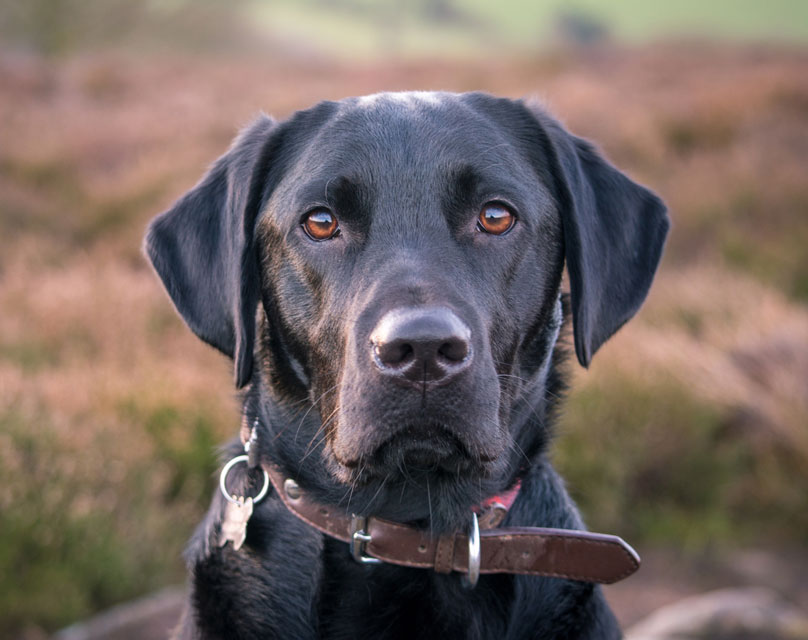Laryngeal Paralysis in Dogs

The larynx is also known as the voice box. It closes the tube to the lungs when the dog swallows something and opens it when the dog takes a breath.
What Is Laryngeal Paralysis in Dogs?
Laryngeal paralysis occurs when the muscles that control the larynx stop working correctly. That means that the cartilage folds don't open and close normally. Instead, they sort of flap in the larynx's opening. When that happens, it's difficult for the dog to take a deep breath. It also makes it harder for the flaps to protect the airway from getting food into it.
Cause of Laryngeal Paralysis in Dogs
Scientists now believe that laryngeal paralysis is one part of a larger neurological disorder. As the condition progresses, the dog's leg muscles become weaker also. This condition is now called Geriatric Onset Laryngeal Paralysis and Polyneuropathy (GOLPP).
GOLPP may also progress to megaesophagus, which is when the muscles controlling the esophagus stop working right, and the tube becomes enlarged and doesn't move food toward the stomach properly.
Trauma to the neck or throat can also cause laryngeal paralysis.
Signs of Laryngeal Paralysis in Dogs
When a dog has laryngeal paralysis, she may show the following signs, which get progressively worse over time:
- Excessive panting
- Exercise intolerance
- Change in the sound of the bark
- Loud breathing
- Coughing
- Respiratory distress
Laryngeal paralysis is more common in large breed dogs than small ones.
Diagnosing Laryngeal Paralysis in Dogs
Many times, a veterinarian will suspect laryngeal paralysis simply by hearing the dog's noisy breathing. However, a definitive diagnosis requires anesthesia, so the veterinarian can observe the larynx with a camera while the dog breathes. The laryngeal flaps don't move out of the airway during a deep breath when a dog has laryngeal paralysis.
Chest x-rays can help determine whether megaesophagus is present along with the laryngeal paralysis. It can also determine whether the dog has aspiration pneumonia. That is a condition that results from inhaling a piece of food. Aspiration pneumonia is a significant risk for dogs with laryngeal paralysis because the laryngeal folds don't close properly during swallowing.
Treatment of Laryngeal Paralysis in Dogs
Mild cases of laryngeal paralysis may be treated with anti-inflammatory medications and mild sedatives. The dog should be kept from doing vigorous exercise or hanging out in hot conditions, which trigger the need for deeper breathing. Rather than a collar that may further irritate the larynx, a harness should be used when the dog is on a leash.
Some dogs with laryngeal paralysis require surgical correction of the condition. There are a few different procedures for the surgeon to choose from based on the dog's health. Surgery can help the dog breathe better but doesn't restore the normal function of the larynx.
Dogs with laryngeal paralysis, even those that have had surgery, can be at risk of aspiration pneumonia. They should also not be allowed to swim since their airway is not adequately protected.
You May Also Like These Articles:
X-Rays in Dogs: What Can They Tell Your Vet?
Disclaimer: This website is not intended to replace professional consultation, diagnosis, or treatment by a licensed veterinarian. If you require any veterinary related advice, contact your veterinarian promptly. Information at DogHealth.com is exclusively of a general reference nature. Do not disregard veterinary advice or delay treatment as a result of accessing information at this site. Just Answer is an external service not affiliated with DogHealth.com.
Notice: Ask-a-Vet is an affiliated service for those who wish to speak with a veterinary professional about their pet's specific condition. Initially, a bot will ask questions to determine the general nature of your concern. Then, you will be transferred to a human. There is a charge for the service if you choose to connect to a veterinarian. Ask-a-Vet is not manned by the staff or owners of DogHealth.com, and the advice given should not delay or replace a visit to your veterinarian.



